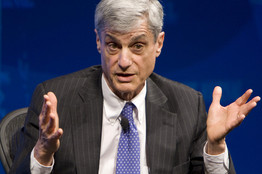Robert Rubin’s defense only raises more questions about his role, his judgment and his character.
Reading today’s Wall Street Journal story poking and probing at Robert Rubin and his role in Citigroup’s downfall, one can’t help wonder why Rubin and Pandit are not better prepared to explain themselves.
Rubin’s quotes are filled with some fascinating self-contradictions. He doesn’t have operating duties–and takes no responsibility for what has happened at the bank–but he wants to stick around to help Pandit. (In what way?) He validates Charles Prince’s strategic plan. (So why isn’t Prince still CEO?) Nobody could have forseen this. (Funny, that doesn’t seem to work for the auto execs.)
Rubin defends himself by saying he was making speeches warning against the underpricing of risk–something we now know was caused by both the rating agencies and the ability to layoff risk through the swaps market (a market he previously protected from regulation.)
According the the Journal, Rubin “acknowledged that he was involved in a board decision to ramp up risk-taking in 2004 and 2005, even though he was warning publicly that investors were taking too much risk. He said if executives had executed the plan properly, the bank’s losses would have been less.”
Robert Rubin is the most influential figure of his generation to straddle Washington and Wall Street. He is a giant of fiscal responsibility. Had he warned seriously against what Citi was doing, the board would have been negligent to have ignored him. If they ignored him, he should have resigned to distance himself from their actions.
In trying to defend himself he claims he is not the only one who is suffering from unfair blame and cites Alan Greenspan. But Greenspan at least admitted publicly that he was wrong. Rubin views it only as a learning experience: “if you look back from now, there’s an enormous amount that needs to be learned.”(Great, thanks.)
We’ve seen this movie before when Greg Ip wrote a front-page story on Greenspan where the sage tried to defend his reputation and avoid culpability. That didn’t work for the Maestro. Here it will only force Rubin farther out on the limb he’s already clinging to.
The way Rubin describes his role at the company, he would have been better off working as a consultant. But Rubin doesn’t want to accept what we all know. Citi paid him a lot of money to rent his reputation. Rubin’s presence was a blessing on their actions. Rubin should have resigned with Prince. The short-term pain would have been easy to get over. Long-term he would have saved his reputation–probably even enhanced it.
Remember the wise warnings of John Kenneth Galbraith that each financial collapse demands that a seemingly all-powerful figure from the boom be discredited. Robert Rubin, who deserves a graceful and dignified exit from the public stage, seems determined to be the one to ruin his own reputation.
Source:
Rubin, Under Fire, Defends His Role at Citi
‘Nobody Was Prepared’ for Crisis of ’08
KEN BROWN and DAVID ENRICH
http://online.wsj.com/article/SB122791795940965645.html



What's been said:
Discussions found on the web: